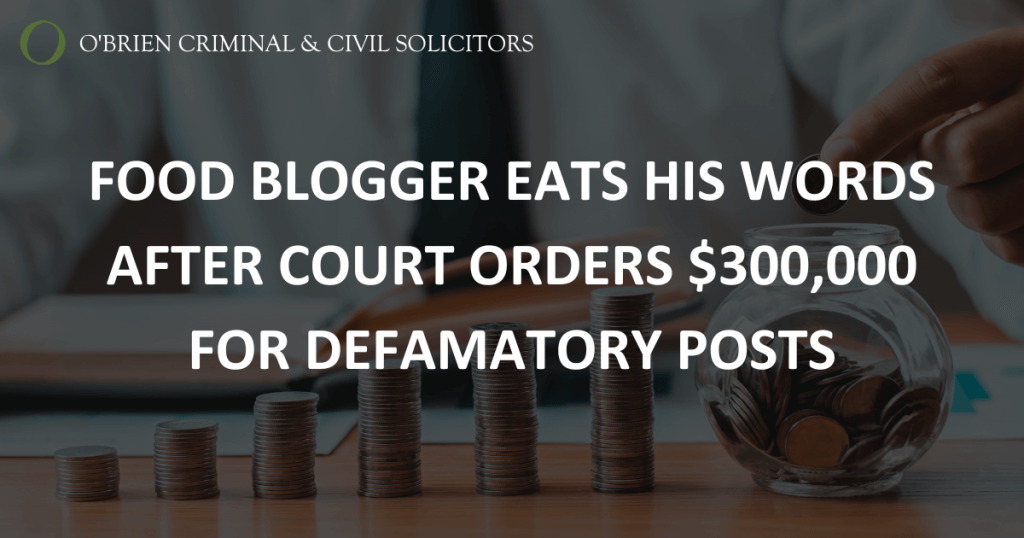A social media food blogger is dealing with an order to pay a rival blogger $300,000. This is after a NSW Court held that a series of posts from a rival blogger stating he was a “paedophile” were defamatory. The plaintiff had reached out to the Australian Cyber Security Centre and NSW Police for help before taking civil action.
Issac Martin, who is better known by his handle @issac_eatsalot, was vindicated in the NSW District Court law week. The two posts by Fouad Najem were held to have been a part of a larger campaign to “attack and discredit the reputation of the plaintiff.”
The Court also noted the lack of participation from law enforcement and online safety administrative bodies in assisting the Plaintiff, who was seemingly left with no choice but to take private action.
“Pedo dog”, “Racist”: Instagram videos deemed defamatory
The defamation case arose from two videos published on Instagram in April this year.
In the first video, Najem called Martin “a paedophile and a racist”.
The following day Najem posted another video on a second Instagram account calling Martin a “pedo dog” and a racist who “attacked Muslims”. He placed the word “RACIST” over a photo of Martin. Najem labelled Martin the “most hated person” in the food review industry.
Najem had approximately 20,000 followers on his main page and 1400 followers on his second account.
Martin received death threats, court hears
Martin claimed the videos were apart of a campaign of roughly 14 videos made across a six-month period.
Martin received direct messages from Najem stating he was a “racist dog” and Najem would “end him” and “destroy” him.
Martin reported the messages to police and sought an AVO against Najem in April.
Her Honour, Judge Gibson refused to refer to the defendant’s Instagram account by name as the matters posted were “so sensational, abusive and profane that they should not be reproduced without the most compelling reasons”.
Najem failed to show up to hearing
Najem did not appear at the hearing nor did he send any legal representative on his behalf. According to Najem’s previous lawyers, the Defendant terminated their services the day before the trial.
Under rule 29.7 of the Uniform Civil Procedure Rules 2005 (NSW) (UCPR), the court can proceed with a trial if the party is absent.
Najem was called three times outside the court at 10:15am by the court officer, as standard practice. The Court also checked the AVL system to check whether Najem attempted to appear online. Her Honour noted Najem made no attempt to contact her associate advising of his whereabouts or requesting an adjournment. As such, the hearing proceeded.
Unclear why neither NSW Police nor Safety Commissioner intervened: Court states
In relation the ability for the court to order a permanent injunction, Her Honour criticised the availability of lack of alternative options available to the Plaintiff.
Her Honour noted that enforcement of a permanent injunction can be lengthy, expensive and uncertain:
- The wronged party’s role in enforcement of an injunction is unclear. Whether the wronged party or some other person such as the Registrar of the Court of Appeal conducts the enforcement, he or she may still to have to bear more legal costs: Johnson v Nationwide News Pty Ltd & 1 Or [2005] NSWCA 17; 62 NSWLR 309 (“Johnson”), as there is “a real question” as to whether the party seeking to enforce the injunction can be awarded their own costs at all (Johnson at [25]; see the decisions referred to in Hague v Cordiner (No. 2) [2020] NSWDC 23 at [35]).
- If the court refuses to make an enforcement order, or the Registrar or other person taking over pursuance of contempt proceedings decides not to go ahead, there may be no right of appeal: Johnson at [22].
- The enforcement process may not only be expensive and uncertain but also lengthy, as the history behind Thunder Studios Inc (California) v Kazal (No 13) [2022] FCA 256 demonstrates.
Her Honour said that while a permanent injunction may appear to be attractive, there ought to be other methods.
Complaint lodged with Australian Cyber Security Centre
On 25 April 2022, the Plaintiff lodged a Cybercrime report to the Australian Cyber Security Centre, who in turn made a report to Campbelltown Police.
The following day, the Plaintiff went to Campbelltown station because he was concerned about his safety given the threatening nature and content of the videos.
Her Honour noted that in his’s affidavit, the plaintiff states that “he has not heard anything further about the status of that application [to Cybercrime] even though it was made nearly six months ago.”
lack of action from eSafety Commissioner: Confusing
Her Honour enquired as to whether the Plaintiff made a complaint under the Online Safety Act 2021 (Cth) to the eSafety Commissioner.
“The plaintiff stated in court that he understood a “brief” for taking the material down had been prepared by, he thought, the eSafety Commissioner, and sent to the police for the relevant steps to be taken. However, when he went to see the police to find out what was being done, he was told that this was “a civil matter” and were not prepared to speak to him or to take any steps,” Her Honour stated in the Judgement.
According to the eSafety Commissioner, there are four Australian Government agencies supporting online safety and security. The Online Safety Act refers to “serious harm” (ss 5 and 7) and sets out a complaint procedure. Her Honour couldn’t be certain whether this process was used.
Her Honour was baffled as to why nothing had been done by any other agency as to the Plaintiff’s complaints.
“It is unclear to me why nothing has been done in relation to the plaintiff’s complaints about the defendant’s video posts, given their threatening nature.”
Her Honour believes that the defendant may continue to post defamatory publications and left it to the Plaintiff whether to pursue violation of the injunction or the take-down procedure under the Online Safety Act.
“I think it potentially likely to be the case that, after this judgment is circulated, there will be further publications by the defendant. If so, use of this new process for take-down orders may be quicker and cheaper than further court proceedings, but that is a matter for the plaintiff.”
Court clarifies social media defamation and serious harm
Her Honour helpfully clarified how the court must approach defamation on social media. She also provided the first Australian case to explore serious harm under the new provisions.
We have distilled this information down into separate articles:
- Social Media Defamation: What Martin v Najem tought us
- First case to address serious harm under NSW legislation
- District Court confirms power to grant permanent injunctions
If you believe your reputation has been harmed over social media, contact our defamation lawyers today. Your first consultation with us is free.
Sarah is a civil solicitor who primarily practices in defamation, intentional torts against police, privacy and harassment.
- Sarah Gorehttps://obriensolicitors.com.au/author/sarahg/
- Sarah Gorehttps://obriensolicitors.com.au/author/sarahg/
- Sarah Gorehttps://obriensolicitors.com.au/author/sarahg/
- Sarah Gorehttps://obriensolicitors.com.au/author/sarahg/





